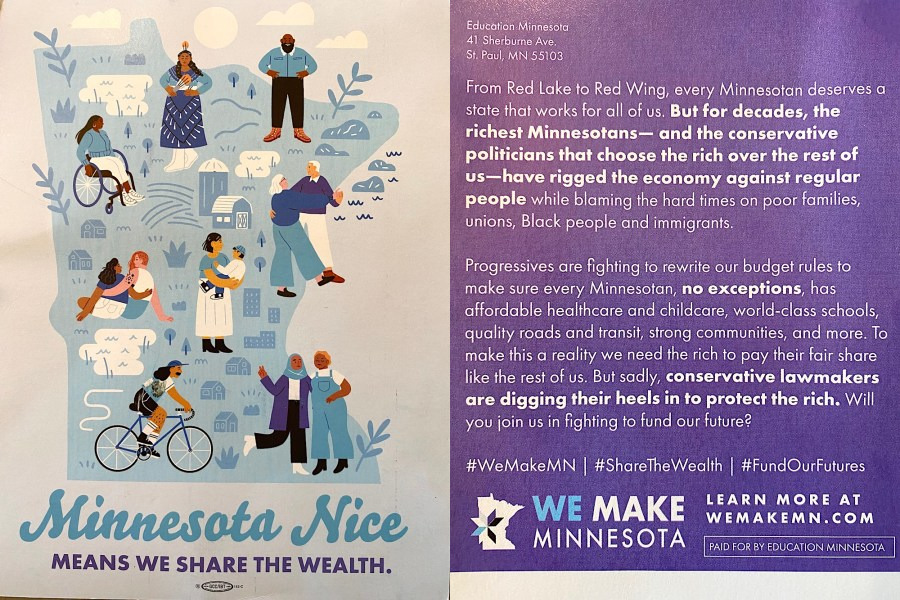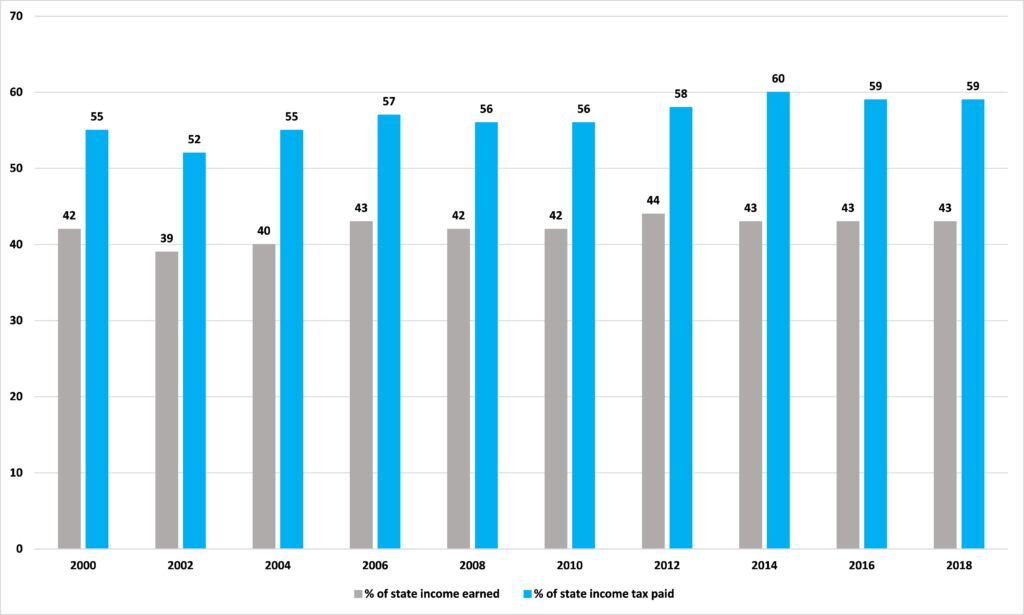Teacher’s union front group peddles lies about Minnesota’s taxes
On Sunday, a post on Powerline shared the leaflet below, which advertises Education Minnesota’s “political initiative WeMakeMN.com“

It claims:
…for decades, the richest Minnesotans – and the conservative politicians that choose the rich over the rest of us – have rigged the economy against regular people while blaming the hard time on poor families, Black people and immigrants.
Progressives are fighting to rewrite our budget rules to make sure every Minnesotan, no exceptions, has affordable healthcare and childcare, world-class schools, quality roads and transit, strong communities, and more.
Here is the kicker:
To make this a reality we need the rich to pay their fair share like the rest of us.
So, according to WeMakeMN, all of Minnesota’s problems would go away if only taxes were more progressive and the rich paid more. The facts show this argument to be utterly bogus.
Minnesota has had progressive taxes for decades
First, Minnesota already has some of the most progressive taxes in the United States and has had for decades.
A recent report from the Minnesota Center for Fiscal Excellence (MCFE) ranked Minnesota’s tax system among the five most progressive in the United States in 2018. And this is nothing new. Here is what the MCFE (then called the Minnesota Taxpayers Association) said in 1997:
Minnesota’s income tax system is significantly more progressive than the average state income tax system.
In 1999:
Minnesota’s income tax system is significantly more progressive than the average state income tax system
In 2003:
Minnesota’s income tax system is significantly more progressive than the average state income tax system
Minnesota’s tax system ranked among the five most progressive in the United States in 2006, among the top six in 2008, 2010 and 2013, and among the top two in 2014. Minnesota has had one of the most progressive income tax systems in the United States for decades.
In short, if Minnesota has all the problems WeMakeMN says it has, those problems have either arisen under one of the most progressive income tax systems in the United States or they have not been solved by one of the most progressive income tax systems in the United States. Either way, the notion that all these problems will disappear simply by making one of the most progressive income tax systems in the United States even more progressive is bizarre.
‘The rich’ are already paying a disproportionate amount of income tax in Minnesota
Second, “the richest Minnesotans” are already paying a disproportionate amount of tax in our state.
As I wrote in March, the the Tax Incidence Studies produced by the Minnesota Department of Revenue show that, in 2018, the top 10 percent of Minnesota households by income earned 43 percent of all income earned in the state but contributed 59 percent of all income tax revenues here. The top 1 percent of Minnesota households by income earned 16 percent of all income earned in the state but contributed 27 percent of all its income tax revenues.
Whether this constitutes a “fair share” is a normative question, but it is certainly true that the richest Minnesotans are contributing a vastly disproportionate share of Minnesota’s income tax revenues, relative both to their numbers and to their incomes.
And again, this is nothing new. Figure 1 shows the share of income earned in the state and income tax paid by the top 10 percent of Minnesota households by income since 2000. This century, the share of state income earned by the top 10 percent of Minnesota households by income has averaged 42 percent and the share of state income tax they contribute has averaged 57 percent — again, a number disproportionate relative both to their numbers and their incomes.
Figure 1: Share of state’s income earned and income taxes paid by the top 10% of Minnesota households by income

Source: Department of Revenue
And we see that the share of state income tax paid by ‘the rich’ did not increase after Governor Dayton’s tax hike in 2014:
And it should have. The other tax rates remain unchanged. Gov. Dayton’s tax hike applied only to those Minnesotans earning over $152,540 in 2014. If the tax hike did bring in more revenue from the top earners as promised, the only way we can square that with the constant share of income tax revenue they pay is if the amount of income tax paid by all the lower earning households went up proportionally.
If the last top rate tax hike didn’t bring a greater share of tax revenues from ‘the rich’, why should another one?
Again, in short, if Minnesota has all the problems WeMakeMN says it has, those problems have either arisen while ‘the rich’ pay a disproportionate amount of tax or they have not been solved by ‘the rich’ paying a disproportionate amount of tax. Either way, the notion that all these problems will vanish if only we can make ‘the rich’ pay an even more disproportionate share of tax would seem to be the triumph of hope over experience.
If Minnesota is broken, it broke under Big Government policies
Back in 2015, President Obama hailed Minnesota as the example that Big Government policies of high taxes and government spending were a path to Nirvana.
When I started at the Center in 2017, we were skeptical of this. Now that skepticism is widely shared. When, in March, Steve Grove, Commissioner of Minnesota’s Department of Employment and Economic Development tweeted in celebration of our state being ranked 2nd best state to live by U.S. News, he was roasted by progressives and had to issue a grovelling clarification:
There is now a consensus emerging as progressives begin to share conservative concerns that all is not well in the state of Minnesota. This could be an exciting time, with both sides working together, provided we can jettison the sort of fact-free gibberish churned out by the likes of WeMakeMN.
Our first contribution to this debate would be to note that the data show that whatever problems you think afflict our state at present — poor education, racial disparities, exploding violent crime — these problems have either arisen while Minnesota has had a high tax and spending model or they have proved resilient to remedy by high taxes and government spending. We submit that it is time to try something different.
John Phelan is an economist at the Center of the American Experiment.